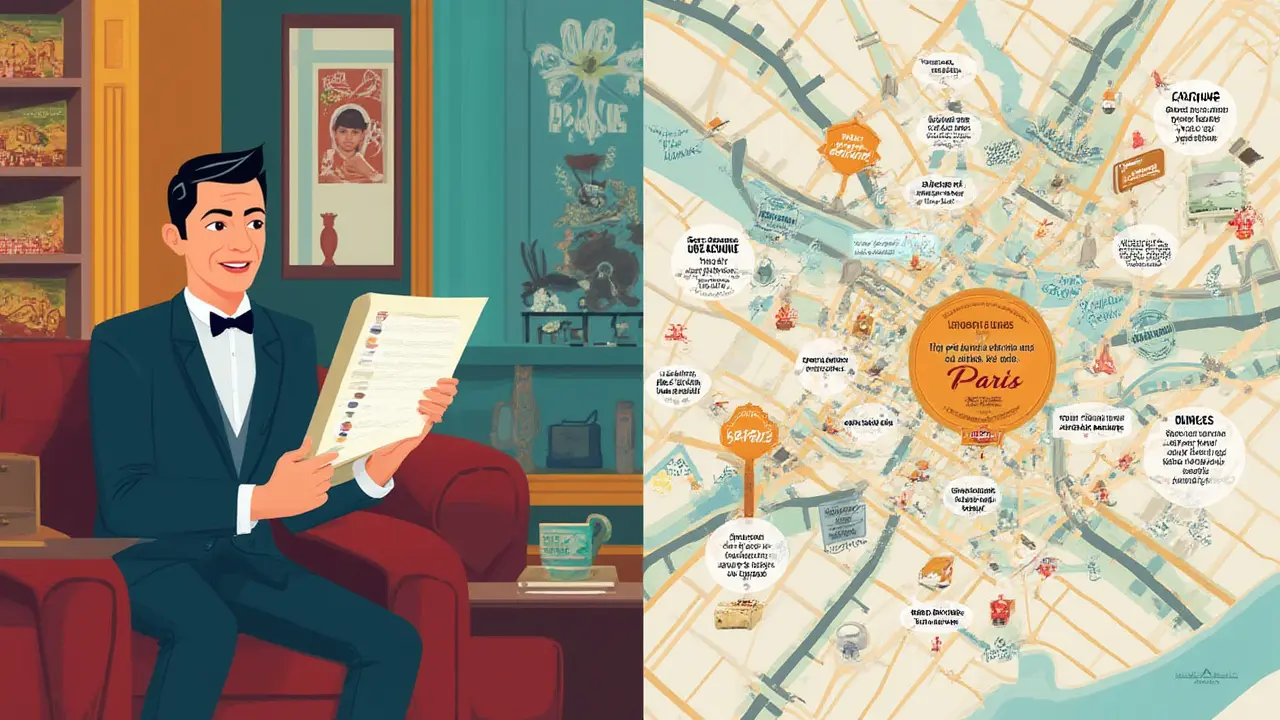Picture this: you’re stepping off your late-night TGV at Paris Gare de Lyon, that gorgeous chaos of arrivals and departures swirling around you, and right outside, something unexpected catches your attention. You probably wouldn’t read about it in a standard guidebook, but the world outside the station thrums with all sorts of life, including a lively—sometimes misunderstood—escort scene. Forget what you think you already know, because this place is full of surprises, urban legends, and real people whose stories will challenge your assumptions.
The Real Scene: What Actually Happens at Gare de Lyon
If you stick to the main drag, Gare de Lyon looks like any other big train station: tourists snapping photos, business travelers glued to their phones, and families waiting for the next train. But after sunset, certain corners outside the main exits take on a different kind of buzz. Here, escorts—mostly women, but sometimes men and transgender individuals too—work the pavement or wait at nearby cafés. The station’s central location and high foot traffic make it a natural hub.
Unlike the hyper-stylized, hush-hush world sometimes depicted in movies, things here feel more matter-of-fact. There’s little of the glitz or intrigue—mostly, it’s regular people trying to earn a living safely. Some work independently, while others belong to agencies. Locals whisper stories of discreet connections: from bankers in a hurry to tourists lost and curious. Media outlets like Le Parisien have documented how this part of Paris evolved post-lockdown, showing how shifting nightlife, changing policing, and economic trends shape the escort scene. The number of registered escort advertisements online in 2023, for example, was up by 17% compared to pre-pandemic years, according to a recent CNRS research paper.
Authorities, though, walk a fine line. Officially, prostitution isn’t illegal in France, but soliciting and pimping are. The result? Escorts work in a grey area, and you’ll notice the tension—it’s legal for two consenting adults to agree to a private arrangement, but not to openly advertise or be managed by someone else. Many escorts at Gare de Lyon rely on word-of-mouth, discreet online ads, or messaging apps. The swirl of languages here—French, English, Russian, Spanish, Romanian—reflects just how international Paris has become.
Some people wander outside the station simply out of curiosity. Others, looking for company or adventure, approach escorts directly or use their preferred online platforms to chat before meeting. The atmosphere isn’t seedy: often, it’s straightforward business chatter mixed with a sense of caution. Most regulars here know the faces, and newcomers learn fast that building trust is key. Cops sometimes do random patrols, but it’s rare to see anything dramatic. The stories you’ll hear range from the mundane (missed trains, awkward first meets) to the heartwarming (clients who show genuine kindness or ask about home).
Common Myths vs. Daily Reality
The stories swirling around Gare de Lyon’s escort scene are full of wild rumors. Hollywood would have you believe it’s all luxury cars and dangerous criminals—but the truth is much less sensational and way more human. Most escorts here aren’t coerced or trafficked. NGOs like Médecins du Monde estimate that, citywide, about 85% work independently or by personal choice—not the narrative you usually see plastered on tabloid headlines.
Myth #1: "It’s all organized crime." Sure, there are risks—especially for new arrivals or people working alone late at night. But most escorts you’ll see outside Gare de Lyon are independent, setting their own boundaries and rates. Yes, sometimes unsavory characters hang around, but these are exceptions rather than the rule.
Myth #2: "It’s always dangerous." Danger can exist, like in any urban job at odd hours. But escorts around Gare de Lyon have developed their own safety protocols: texting a check-in buddy; refusing suspicious clients; sticking to well-lit areas or setting meetings at reputable cafés instead of obscure alleys. Some even use mobile apps with emergency buttons. Paris police data from 2022 show that violent incidents involving escorts declined by nearly 12% near major transport hubs, following targeted awareness campaigns.
Myth #3: "Everyone is forced or desperate." The spectrum of motivation among escorts is vast. Some are students making ends meet, others are expats picking up language skills, while a portion enjoy the flexible hours and social aspect. For many, it’s a job—sometimes empowering, sometimes exhausting, always complicated. A 2023 survey by the association Les Amis du Bus des Femmes found that 62% of Paris-based escorts said they preferred their work arrangements over other available jobs.
It’s worth noting that stigma is still strong. Escorts often hide their job from family or friends. But among each other, there’s a quiet camaraderie: they share tips, warn each other about bad clients, and sometimes split cab fare home at sunrise. The image of “the lonely streetwalker” misses all this messy reality and misses, most importantly, that people here have agency and stories beyond their job titles.

What Visitors Should Know: Approach, Etiquette, and Costs
Curiosity is natural, but if you’re thinking about approaching an escort near Gare de Lyon, there’s an unspoken rulebook. First: always be direct, never creepy or vague. Most escorts appreciate honesty—state your intention clearly but respectfully. It’s not about rehearsed pickup lines; it’s about treating people like people. One regular escort, Sophie, told a local podcast, “The best clients are the polite ones who don’t pretend to be something they’re not.”
Money talk often happens right up front. Typical rates in Paris range from €150–€400 an hour, depending on experience, services, time, and specifics. Nobody likes haggling or surprises; the golden rule? Never touch unless it’s consensual, and always clarify boundaries first. Don’t take photos or share details—privacy is a big deal in this world.
Knowing some French goes a long way, even basic greetings. But many escorts speak English, and some know additional languages. Payment is usually expected in cash. While digital transfers (like Lydia or Paylib) are sometimes possible, cash remains preferred for privacy and safety. Never offer anything dodgy—escorts avoid risky situations and illegal substances.
If something feels off or you’re unsure, walk away. Good escorts will do the same; both parties rely on gut instinct. Another tip: if you’re booking someone via an online ad, double-check photos and reviews for authenticity. Fake accounts aren’t common here, but scammers exist everywhere. Paris also enforces strict public decency laws—so keep things private and low-key. If you don’t know where to go, some escorts are happy to suggest hotels or quiet cafés nearby, where arrangements are safer and stress-free.
Here’s a snapshot of what you might expect, based on 2025 rates in the area:
| Service | Typical Rate (€) | Time |
|---|---|---|
| Quick meeting | 100-150 | 30 min |
| Standard hour | 150-250 | 60 min |
| Evening/date | 400-700 | 3-4 hrs |
| Overnight | 1000+ | 8-10 hrs |
Remember, tipping is not mandatory but always appreciated for good service. And, crucially: protection is non-negotiable—Paris health authorities provide free testing and distribute condoms at several city centers, and most escorts will insist on safe practices for everyone’s peace of mind.
How Technology Changed the Escort Landscape
This isn’t the world of discreet encounters in smoky bars. Smartphones and messaging apps have totally overhauled how escorts meet clients—in Paris, nearly 80% of connections now start online. You’ll see websites like Vivastreet, SexModel, and sometimes even Telegram channels tailored to the city. Escort profiles often list languages spoken, preferred locations, and verified reviews, making it way easier for everyone to stay safe.
Technology also helps reduce risk. Escorts near Gare de Lyon often text a friend before and after meetings, drop a location pin, or set up code words in case something goes wrong. Some agencies run background checks—on both escorts and clients—thanks to digital tools. Facial recognition? Not really. It’s more about simple, pragmatic security steps.
Clients are getting smarter too. Many now check independent review forums before booking, which weeds out dodgy operators. Safety isn’t only about physical security; reputation matters. Word travels fast in Paris. One bad review or an awkward encounter can echo through the community for weeks. And since Paris is a city where privacy is treasured, both sides go to great lengths to keep things discreet.
But technology isn’t perfect. Scams still happen: fake profiles, phishing attempts, and, sometimes, blackmail threats after someone shares too much personal info. The most common advice you’ll hear? Never send ID photos, deposit money in advance, or reveal personal details unless you’re absolutely sure who you’re dealing with.
Beneath all this, the old-school approach persists too. It’s not rare to see regulars return to the same spot at Gare de Lyon for years—relationships, or at least mutual respect, often grow through repeated meetings. Digital-first, but never digital-only: Paris remains as personal and unpredictable as ever.

Safety, Support, and Social Change
The escort scene at Gare de Lyon doesn’t exist in a vacuum—it’s tightly bound to bigger trends in Paris and Europe. Over the last five years, French law has leaned toward criminalizing the purchase of sex, not the sale. This remodels the risks. Escorts, especially migrants and trans women, sometimes face more scrutiny or discrimination. A French National Assembly report from late 2024 showed that 27% of surveyed escorts felt more harassment from police now than when they started.
But there’s support out there: grassroots organizations like Acceptess-T and Les Roses d’Acier offer legal guidance, health checkups, and even emergency housing for those in trouble. Every Thursday, a pop-up van shows up not far from Gare de Lyon, handing out food, medical advice, and, sometimes, just a listening ear. Since 2022, the city has rolled out safer nightlife programs, training late-night staff at local bars and hotels to spot trouble and offer safe spaces. All this weaves a web of community resilience and self-advocacy that flies under most outsiders’ radar.
If you watch closely, you’ll see how attitudes are changing, little by little. More Parisians are pushing for regulation that protects workers rather than shaming or punishing them. In the 12th arrondissement alone, nearly 300 residents signed a petition last year calling for legal protection and fair regulations. It’s slow, but more conversations are happening—on TV, in the papers, and sometimes over a cigarette break outside the station.
No one comes to Paris expecting to learn about the secret life outside Gare de Lyon, but if you do, remember: you’re seeing a piece of the city’s living, breathing reality. These are real people in a complicated world—deftly navigating old laws, new tech, language barriers, the freezing wind, and always, the insistence on dignity. Whether you’re passing by, seeking connection, or just curious, just treat everyone with respect. The city might not be as romantic or as scandalous as the rumors, but it’s way more interesting for those who care to look closer.




